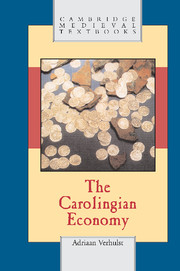9 - The economy and the state
Published online by Cambridge University Press: 05 June 2012
Summary
The king's interference with economic matters, however important under the Carolingians, may not straightforwardly be called an economic policy or be said to be inspired by ‘semi-dirigism’. For that his interventions lacked a general plan and a long term view. They were often inspired by concrete situations and were occasional and pragmatic. Let us consider different economic sectors where this opinion can be tested.
Agriculture was no doubt the most important sector and it is the one in which, more particularly, Charlemagne has been said to have practised an ‘agrarian policy’. This statement was based on the existence of a capitulary totally and specially devoted to the management of the royal estates and known as the capitulary de Villis (abbreviated CV). Its special character, different from most capitularies containing regulations on very diverse matters, also appears from the fact that in the only existing manuscript the CV is preceded by three inventories of ecclesiastical and royal estates, known as the Brevium exempla (BE), clearly intended to be used as models for similar inventories. The long format of the manuscript (29.5 to 12.5 cm) suggests that it had actually been used on inspection tours as a model. While the manuscript probably dates from around 825, the date of the text itself of the CV can approximately be placed between 792–3 and 800. The text, without much logical order, was probably drawn up in the aftermath of the famine of 792–3.
- Type
- Chapter
- Information
- The Carolingian Economy , pp. 126 - 131Publisher: Cambridge University PressPrint publication year: 2002



